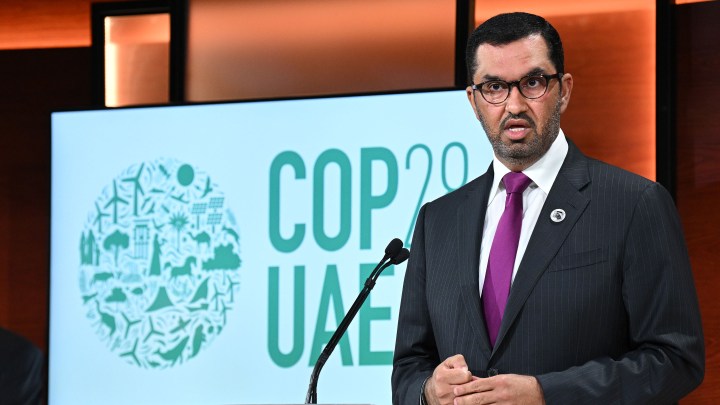
What to expect from COP28, the annual U.N. climate summit

The annual United Nations meeting to assess global progress on fighting climate change begins later this week. COP28, as its called will kick off in Dubai on Nov. 30 and will convene private-sector and government leaders to figure out the next steps for limiting global warming and cutting emissions of climate-altering fossil fuels.
For more on what to expect from the gathering, “Marketplace Morning Report” host David Brancaccio spoke with Vijay Vaitheeswaran, global energy and climate innovation editor at The Economist. He’s got a list of three things he’ll be watching for while he’s in Dubai for the summit. The following is an edited transcript of the conversation.
David Brancaccio: What’s at the top of this list?
Vijay Vaitheeswaran: I have one word for you: methane.
Brancaccio: Another gas, but it’s not carbon dioxide — that gets so much attention.
Vaitheeswaran: It has an inferior public relations man. But, in fact, methane is the most potent gas we can act on that creates warming in the short term. It’s probably the quickest win to try to tackle emissions of methane, from the fossil fuel industry in particular.
Brancaccio: It’s not trivial, but it’s a lower-hanging fruit. If you could capture the methane before it goes out in the atmosphere, you might have positive effects quicker.
Vaitheeswaran: That’s exactly right. Carbon dioxide stays up in the atmosphere for hundreds of years; it’s much more long-lived. It’s the principal problem. But methane, which has been largely overlooked, is the second-biggest cause, and it acts much more quickly. It also means that we can reduce its effects quickly. So it could buy us a crucial decade or more, during which we can scale up alternatives, like clean energy innovation.
Brancaccio: So as COP28 goes on, you’ll be watching what they say and do about methane. But No. 2 [on your list] has to do with the money to deal with the whole kit and caboodle.
Vaitheeswaran: It’s always about the money, and rightly so. The usual sort of headbanging that goes on is developing countries complain about the injustice of it all, because rich countries — let’s admit it, we created the problem. Most of the pollution that’s in the air comes from industrialization. And rich countries haven’t coughed up the amount of money that has been promised in the past, let alone funding new things like a loss and damage fund that was agreed at the last COP in Egypt a year ago. We’re talking about millions, up to $100 billion — funding that’s been a source of great political debate.
In fact, it’s a bit of a sideshow, because the amount of money that we’re going to need to deal with the climate challenge is in the trillions of dollars.
Brancaccio: And the last point here: how fast to cut down fossil fuels that produce carbon. Or, put another way, how fast to cut out fossil fuels — reduce the stuff or end it?
Vaitheeswaran: Well, you put your finger right on the hot-button issue: Is it going to be a phase-down or a phase-out of fossil fuels? Again, a lot of blood will be spilled in the hallways in Dubai at the convention center when negotiators, 198 countries, have to agree this. In reality, the world gets about 80% of its energy today from fossil fuels. So the idea of getting rid of them tomorrow is really just a political point. The reality is we need to invest, mostly from the private sector, in those clean energy technologies and energy efficiency, and technologies for removing emissions, like negative emissions. That’s how we’re going to transform the energy system.
Brancaccio: There has to be some irony that such a big producer of fossil fuel, the UAE, is hosting this particular conference.
Vaitheeswaran: It’s a subject of great, either, laughter or terrifying nightmares depending on your ideological point of view. And if it takes a “Nixon goes to China” moment — that is an unexpected political character to bring an unusual coalition together — and it might be the United Arab Emirates, being a big oil producer, that gets national oil companies to agree to phase down their methane emissions. That might be the moment that we’re looking for.
There’s a lot happening in the world. Through it all, Marketplace is here for you.
You rely on Marketplace to break down the world’s events and tell you how it affects you in a fact-based, approachable way. We rely on your financial support to keep making that possible.
Your donation today powers the independent journalism that you rely on. For just $5/month, you can help sustain Marketplace so we can keep reporting on the things that matter to you.

















